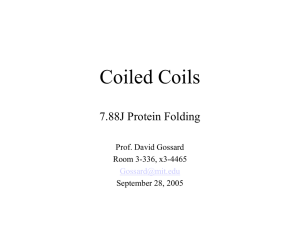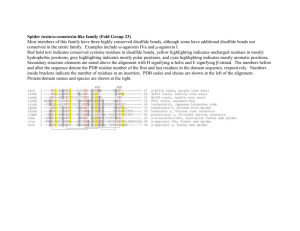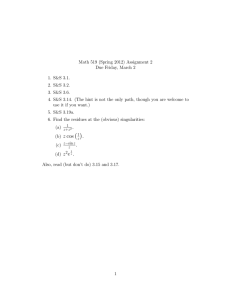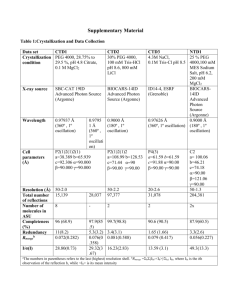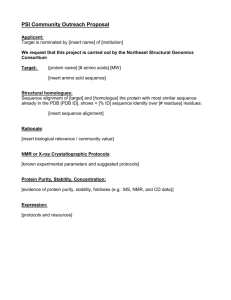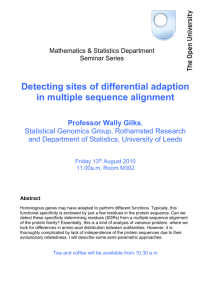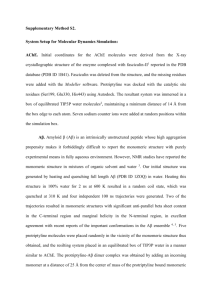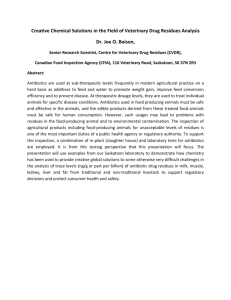Document 13341525
advertisement
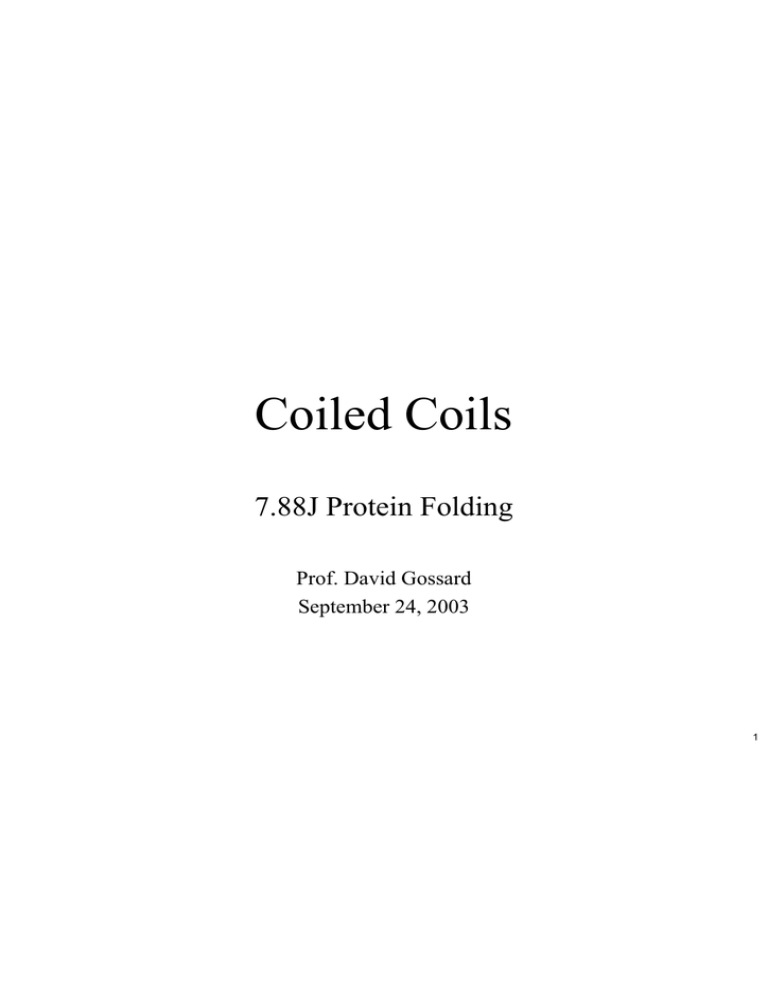
Coiled Coils 7.88J Protein Folding Prof. David Gossard September 24, 2003 1 PDB Acknowledgements The Protein Data Bank (PDB - http://www.pdb.org/) is the single worldwide repository for the processing and distribution of 3-D biological macromolecular structure data. Berman, H. M., J. Westbrook, Z. Feng, G. Gilliland, T. N. Bhat, H.Weissig, I. N.Shindyalov, and P. E.Bourne. “The Protein Data Bank.” Nucleic Acids Research 28 (2000): 235-242. (PDB Advisory Notice on using materials available in the archive: http://www.pdb.org/pdb/static.do?p=general_information/about_ pdb/pdb_advisory.html ) PDB molecules and citations used in the “Coiled Coils” Lecture Notes for 7.88J - Protein Folding PDB ID: 2ZTA JRNL reference: O'Shea, E. K., J. K. Klemm, P. S. Kim., and T. Alber. “X-ray structure of the GCN4 leucine zipper, a twostranded, parallel coiled coil.” Science 254 (1991): 539. Pages: 3 (“Outline”), 14-15 (“GCN4 Leucine Zipper”) 2 Outline • Review Key Features of Coiled Coils • Examine a Particular Example – GCN4 Leucine Zipper (2ZTA) 3 Coiled Coils • Left-handed spiral of right-handed helices • May be parallel N N C C or anti-parallel C N N C 4 2-Stranded Coiled Coils • GCN4 • Tropomyosin • Intermediate filament protein • Lamin • M-protein • Paramyosin • Myosin 5 Crick’s Models • Geometry of Helix (Coil) z Zot Zo > 0 right-handed R(t) ro P x y x(t) = ro cos(Zo t) y(t) = ro sin(Zo t) z(t) = P (Zo t /2S) 6 Geometry of Coiled-Coil Minor z helix t z' y' r1 t ro x Major helix z x' Zo < 0 Major axis left-handed Minor axis Z1 > 0 right-handed y x(t) = r0 cos Z0t + r1cos Z0t cos Z1t - r1cos D sin Z0t sin Z1t y(t) = r0 sin Z0t + r1sin Z0t cos Z1t + r1cos D cos Z0t sin Z1t z(t) = p0(Z0t) - r1sin D sin Z1t D = tan –1 (2Sr0/p0) x Crick, F. H. C. “The Fourier Transform of a Coiled-coil.” Acta Cryst 6 (1953): 685-689. y 7 Features of Coiled Coil • Heptad repeat in sequence – [a b c d e f g]n • Hydrophobic residues at “a” and “d” • Charged residues at “e” and “g” g +/Hydrophobic residues at “a” and “d” Charged residues at “e” and “g” c d f a e -/+ b Figure adapted from Cohen, et.al., PROTEINS: Structure, Function and Genetics 7:1-15 (1990) 8 Significance of Heptad Repeat • Hydrophobic residues at “a” and “d” – form hydrophobic core with other coil • Charged residues at “e” and “g” – form ion pairs with oppositely charged residues on other coil – may distinguish parallel from anti-parallel coiled coils e - b + g a c d f f d c g + a b - e Figure adapted from Cohen, et.al., PROTEINS: Structure, Function and Genetics 7:1-15 (1990) 9 Heptad Repeat in 3D Charged residues +/­ g -/+ +/­ g f e c d d b e a c f a Hydrophobic residues b -/+ 10 Hydrophobic Core is on Axis of Superhelix ( ~Straight) d d a a 11 Charged Residues Provide Stability, Registration Charged residues “e” and “g” Ion pairs between coils 12 “Knobs in Holes” Packing “about 20°…” Helix axis Figure adapted from Crick, F. H. C. “The Packing of D-helices: Simple Coiledcoils.” Acta Cryst. 6 (1953): 689-697. 13 GCN4 Leucine Zipper (2ZTA) • • • • Parallel Coiled Coil Major helix pitch ~ 180 A/turn 8 turns 31 residues O’Shea, Erin, Juli D. Klemm, Peter S. Kim, and Tom Alber, “X-ray Structure of the GCN4 Leucine Zipper, a Two-Stranded, Parallel Coiled Coil.” Science 254 (October 25, 1991): 539-544. 14 GCN4 Leucine Zipper (2ZTA) • Residues contain heptad repeat ARG1 a MET2 VAL9 ASN16 VAL23 VAL30 b LYS3 GLU10 TYR17 ALA24 GLY31 c GLN4 GLU11 HIS18 ARG25 d LEU5 LEU12 LEU19 LEU26 e GLU6 LEU13 GLU20 LYS27 f ASP7 SER14 ASN21 LYS28 g LYS8 LYS15 GLU22 LEU29 • Ion pairs – Lys15 – Glu20’ – Glu22 – Lys27’ – Glu22’ – Lys27 15 Crossing Angle ~18o 16 Molecular Surface of GCN4 17 3D Demonstrations • Tour of Heptad Repeat (3D Studio MAX) • Tour of GCN4 (Swiss-PDB) 18 3 & 4-Stranded Coiled Coils • 3-stranded – Gp17 (T7) – Fibrinogen (heterotrimer) – GCN4 mutant • 4-stranded parallel – GCN4 mutants • 4-stranded anti-parallel – – – – Myohaemerythrin Tobacco mosaic virus Cytochrome c’ Apoferritin 19 3-Stranded Coiled Coil!? (parallel) • Axial symmetry • Hydrophobic core • Ion pairs b c f g e b d e a a d d f c g Figure adapted from Cohen, C., and D.A. D. Perry, “D-helical coiled coils and bundles: How to design an D-helical protein.” PROTEINS: Structure, Function, and Genetics 7 (1990): 1-15. g a c e b f 20 4-Stranded Coiled Coil!? (parallel) f • Axial symmetry • Hydrophobic core • Ion pairs b c b g e a d e g a c d f f a d c g a e d e Figure adapted from Cohen, C., and D.A.D. Perry, “D-helical coiled coils and bundles: How to design an D-helical protein.” PROTEINS: Structure, Function, and Genetics 7 (1990): 1-15. b g c b f 21 Recall - GCN4 • Hydrophobic core: “a” (blue) Val9 Asn16 Val23 Val30 “d” (red) Leu5 Leu12 Leu19 Leu26 Harbury, P. B., Tao Zhang, Peter S. Kim, and Tom Alber. “A Switch Between Two-, Three-, and Four-Stranded Coiled Coils in GCN4 Leucine Zipper Mutants.” Science 262 (1993): 1401-1407. 22 Mutagenized Hydrophobic Core • p-LI ( X => Leu - volume-preserving) “a” “d” Leu9 Ile5 Leu16 Ile12 Leu23 Ile19 Leu30 Ile26 • => tetramer (parallel) !! 23 Mutant p-LI GCN4 P-LI 24 GCN4 p-LI f • Ion pairs/salt bridges c – ‘e’ & ‘g’ (5/12) g • GluB6 – ArgA1 b – ‘g’ & ‘b’ (4/8) • LysD8 – GluA10 – ‘e’ & ‘c’ (5/8) b e a d e g a c d f f a d c g a • HisB18 – GluC20 e d e b g c b f 25 MIT OpenCourseWare http://ocw.mit.edu 7.88J / 5.48J / 10.543J Protein Folding and Human Disease Spring 2015 For information about citing these materials or our Terms of Use, visit: http://ocw.mit.edu/terms.
